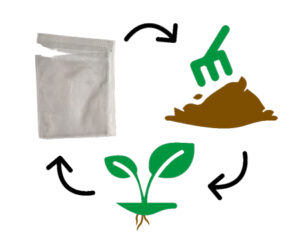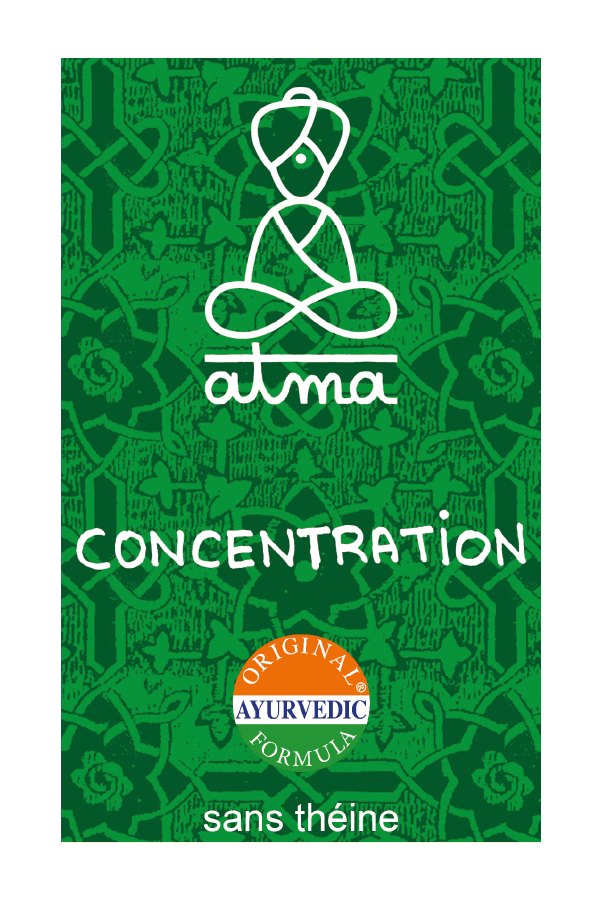Focus
In Āyurveda the strength of the mind is closely related to the purity of the body in which the mind radiates. The networks, especially of the nāḍī and śrotas must be without major obstructions. Āyurveda also uses an ethical code which is called ācāra rasāyana which corresponds to the yama and niyama of Yoga. This ethical code allows one to be safe from all destabilising eventualities for the mind and also for the body. It is then in this condition of balance that the person is able to really benefit from the plants that will help to strengthen concentration.
Buddhi
Focus
Ecology

- Our freshness envelope, despite resembling plastic, is made from cellulose therefore compostable.
- Our teabags and string are also compostable.
- Our tag is made from recyclable PEFC™ paper.
Note: we sell the majority of our infusions only in tea bags and not in bulk. The difference in density of the ingredients would make the heavier ones fall to the bottom of the container. Thus, the mixture would lose its homogeneity and the medicinal proportions would not be preserved.
Ayurvedic benefits
Buddhi is a relaxing and soothing herbal tea and is ideal for people under intellectual stress (students, researchers, teachers, artists, etc.) who need to maintain a stress-free concentration and who put a lot of strain on their minds. Buddhi put in circulation toxins stored in the ducts (nāḍī and śrotas) of the head. This improves focus and memory during intellectual effort.
It can be diuretic during the first few doses, as emonctoires expel toxins that are released back into the body.
Buddhi is a synergy of plants based on what is called Medhya Rasāyana Śuddhi : “the essential detoxification so the regeneration of what “carries” intelligence can be established”. Buddhi’s basic bitter and astringent dynamic seeks to balance Kapha in its Mala form (waste) by drying it so that Vāta regulates itself without obstruction. An obstructed Vāta is destabilizing for body and mind. Vāta shares with the mind (Manas) the qualities of movement and sensation. Vāta carries the spirit in a way. If Vāta is blocked, so is the mind. The Prāṇa deviates and puts under pressure different nāḍī which disturb the psycho-energetic balance of the body. Buddhi also soothes Pitta who often associates with Vāta in a principle of warmth that can “turn” in the mind and prevent the person from being focused, lucid and temperate.
In Āyurveda the strength of the mind is closely linked to the purity of the body in which the mind shines.
Networks, including nāḍī and śrotas, must be free of major obstructions.
Āyurveda also uses a code of ethics called Ācāra Rasāyana which corresponds to the Yamā and Niyama of Yoga.
This code of ethics protects against any destabilizing eventualities for the mind and therefore the body.
It is then in this condition of balance that the person is able to really benefit from the plants that will strengthen his focus.
Ingredients
Brahmi* – Sri Lanka / Nepal
Macis* – India / Madagascar
Cassia Cinnamon* – Madagascar / Sri Lanka
Valerian* – Poland
Rama tulsi* – India
Angelic* – France
Ginko* – France
Sage* – France
Willow* – France
Black pepper* – Sri Lanka / India / Madagascar
Larch* – France
* : from organic farming
Taste
– Rasa (taste) : bitter, pungent and astringent, slightly sweet in aftertaste.
– Guṇa (quality) : light and dry.
– Vīrya (energy) : warm.
– Vipāka (result) : pungent.
Preparation
One Buddhi teabag for 200ml of boiling water
Steep 10 to 12 minutes..
Drink one to four cups a day.
When Buddhi is tepid you can add a one-year honey, more oxidized and less heavy than a younger one.
Vaidya's advice
• Take breaks and focus on your breathing.
• Self-massage or Abhyanga massage are good for intellectual effort, especially for those in lack of physical activity.
• Sweetness (complete and natural sugars, fruits etc.) and creaminess (oilseeds, ghee for example) feed your mind.

